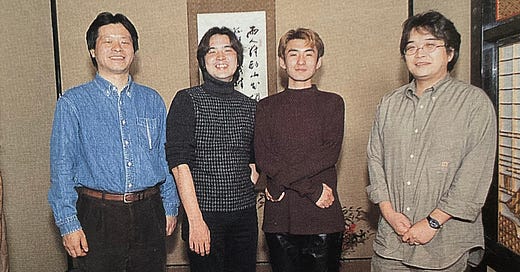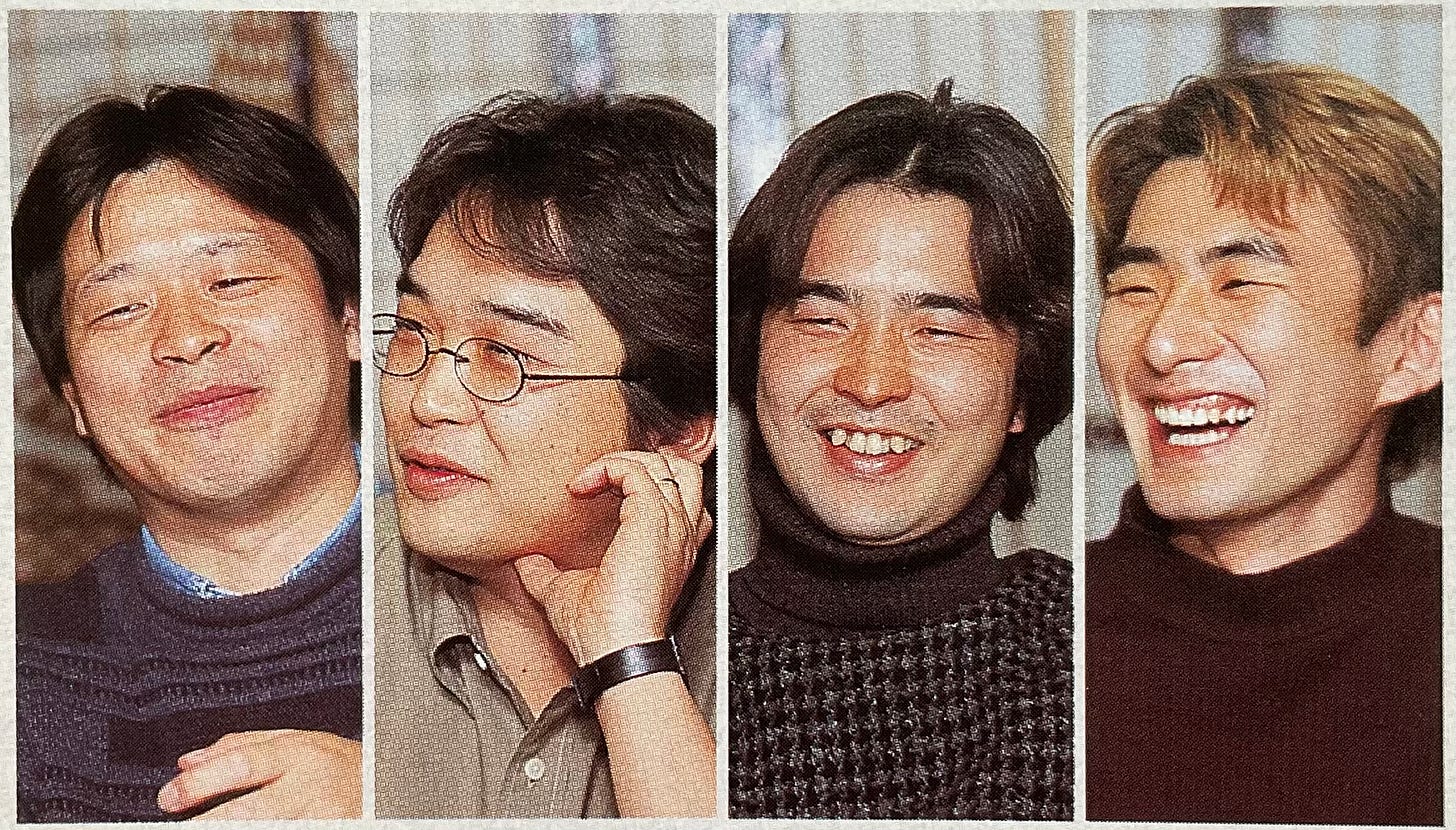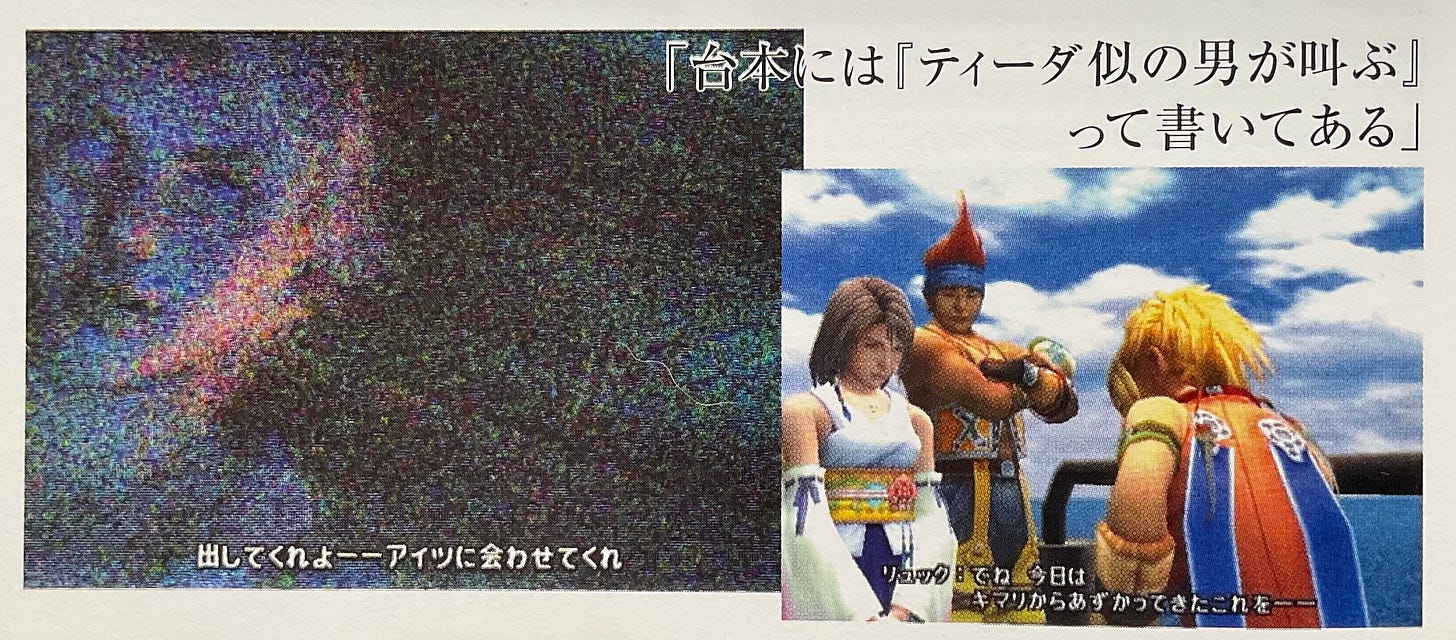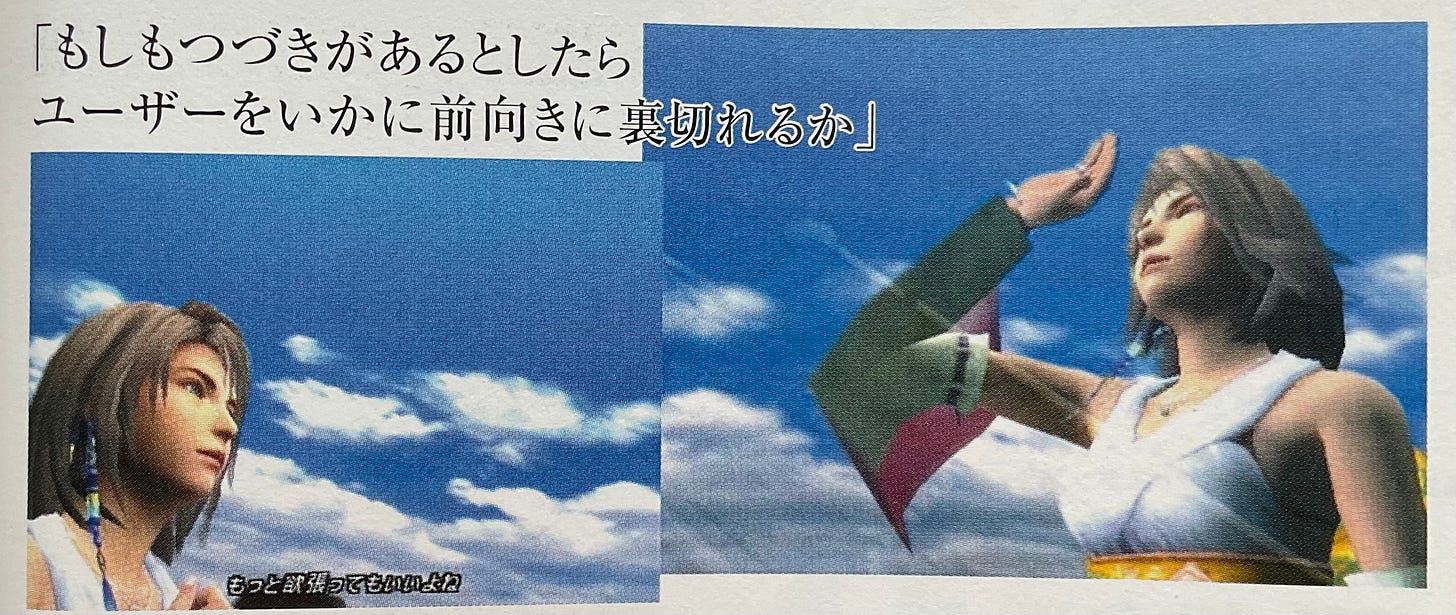Scenario Staff Symposium, Parts 1 & 2
An interview with the "Scenario Staff" of Final Fantasy X.
(Left to right: Yoshinori Kitase, Kazunari Nojima, Motomu Toriyama, Daisuke Watanabe)
In Celebration of Completing FFX International: We invited four members of the scenario staff to a meal. This is the official story, but in reality, the plan was to loosen their tongues with food and get them to reveal what they couldn’t last time. Let’s see what kind of secrets emerge...
(Host: Akira Yamashita)
FFVII and FFX Were Connected!?
Interviewer: We talked about various things in the last "FFX SCENARIO ULTIMANIA." It's been nearly six months since then. Have any new thoughts about FFX come up?
Kitase: Well...this time, we added a sort of epilogue to FFX International. It turned out to be surprisingly difficult to think of another story in that world. The world is so well-constructed that it's hard to expand on. On the other hand, it made me realize how thoroughly we made FFX.
Nojima: With FFVII, we could easily add Zack’s episode in the International version. But for FFX, since the main story was already complete, adding new episodes might disrupt the established world. It could over-explain things.
Kitase: Now that you mention it, we once talked about making a sequel to FFVII.
Interviewer: A sequel to FFVII!!
Kitase: Well, it was half in jest. The ending of VII leaves Holy unresolved and jumps to "500 years later." There’s room to fill in that gap. Since Nojima and Toriyama worked on VII, the idea momentarily excited us.
Interviewer: So what happened to that FFVII sequel idea?
Nojima: For me, FFVII and FFX felt connected, so I was satisfied with VII.
Interviewer: Connected?
Nojima: It's nothing major. It's just that the way people die and what happens afterward is fundamentally the same in both stories. I sometimes let my thoughts slip into the story. For example, pyreflies are green in my mind, like the Lifestream in VII.
Interviewer: Green when they die...could it be...?
Nojima: Yes. In my mind, pyreflies are the Lifestream from VII.
Kitase: When we were thinking about the epilogue for FFX International, Nojima’s reincarnation idea came up. It seemed a bit influenced by VII.
Nojima: Yes. As long as there's a Lifestream, such things can happen...
Interviewer: Reincarnation? Who was going to be reincarnated?
Nojima: That’s a secret (laughs).
Kitase: It was a story about someone unexpectedly going to the Farplane.
What’s on Seymour’s Chest?
Interviewer: Talking about VII leaves Watanabe, who joined the FF team from X, out. Speaking of Watanabe, you handled Seymour’s dialogue, right?
Watanabe: That’s a rather forceful segue (laughs). I feel like I could have done more with Seymour.
Interviewer: In what way?
Nojima: We could have had two more battles with him (laughs).
Everyone: (Laughter)
Toriyama: A character like Seymour becomes a laughable presence with each battle. It’s unavoidable.
Watanabe: Compared to Jecht, Seymour leaves a weaker impression in terms of destiny. He’s also less memorable than Sin as a villain. I wanted to flesh him out more.
Nojima: Speaking of which, Nakazawa (Takatsugu Nakazawa, Battle System Planner) once suggested putting Seymour in the Monster Arena.
Toriyama: Yes, he said, "Let’s use anything we can, even Seymour."
Watanabe: Please don’t call it "Seymour-type" (laughs).
Kitase: It sounds like a monster species (laughs).
Watanabe: It seems Seymour isn’t well-loved. I must be the one to love him (laughs).
Interviewer: By the way, what is that thing on Seymour’s chest?
Toriyama: Chest hair (laughs).
Watanabe: Chest hair!? I’m shocked!
Toriyama: It’s not just chest hair; it’s a tattoo as well. Characters like Jecht and Brother have tattoos because we had the "Tattoo System" idea before Watanabe joined the team.
Kitase: Yes. The idea was that magic would come out of the tattoos, like a "Fire" tattoo or an ability tattoo.
Toriyama: Bahamut's tattoo was supposed to be on Yuna's back.
Interviewer: I borrowed the initial plot from Nojima for this book, and along with the tattoo system, it seems there were many changes before FFX took its final shape.
Nojima: Yes, but there were many versions even before the plot I gave you.
Toriyama: There was a version where Yuna was Tidus's sister and her job was a nurse.
Kitase: A deadly disease was spreading, and Yuna was traveling to cure it. Following Yevon's teachings, she would travel the world healing people.
Toriyama: Yevon was like the Red Cross, and Maester Mika was the chairman.
Kitase: However, Yuna wasn't actually healing people; she was spreading the disease. The cure was actually lethal.
Interviewer: That’s quite a dark story.
Kitase: The concept of Yuna's beliefs being betrayed comes from that version.
The Meaning of the Ending is Finally Revealed
Interviewer: Now that everyone is getting a bit relaxed, I’d like to move on to today’s main topic...
Nojima: Excuse me, I need to go to the bathroom... (stands up)
Toriyama: Ah, he ran away!
Kitase: Let’s discuss that topic after Nojima comes back. (calmly takes control of the situation)
(Some time passes, and Nojima returns and sits down)
Interviewer: So, let’s ask again. Last time in "SCENARIO ULTIMANIA," we left the meaning of the ending deliberately vague...
Nojima: I knew it.
Interviewer: There’s an overwhelming number of readers who want to know the meaning of that ending. As a roundtable discussion for "Q," we can’t avoid this topic. Of course, I understand Nojima-san’s wish to leave it to the player’s imagination, but could you talk a little about it?
Nojima: About that final scene with Tidus... Around a month before we went to America to record the voices for the overseas version, I consulted with Kitase-san about whether it would be better without that scene.
Kitase: I was also really unsure about whether to include it... But originally, you were the one who came up with that scene, right, Nojima-san?
Nojima: Yes, that’s true...
Interviewer: According to the movie team I spoke with recently, the final scene with Tidus was initially planned to show him surfacing from the water, right?
Nojima: Yes, that’s correct.
Kitase: I imagined Tidus swimming towards the horizon of the vast ocean rather than just coming out of the water.
Toriyama: Whether Tidus surfaced or not, I think we intended to make it unclear where it was happening. So, I believe the meaning of the ending wouldn't change even if he did surface.
Nojima: To me, that last scene simply means that Tidus is somewhere, in some form, and nothing more or less than that... It doesn’t matter where, as long as he’s somewhere. There’s a possibility they might meet again.
Toriyama: Yes. We wanted to leave it open-ended. However, the lines of the Fayth of Shiva and Yojimbo made me wonder about their meaning. I think the users have been pondering that too.
Nojima: Wasn’t that written by Watanabe-kun?
Watanabe: I think it was Nojima-san, but... I’m not sure. However, it’s true that we tried to include both negative and positive nuances. We wanted to ask the players, "How do you interpret this ending? It’s your story."
Kitase: The one who was adamant about including that final scene was Toriyama, right?
Toriyama: I really wanted a happy ending.
Kitase: But can we really say that was a happy ending...?
Watanabe: It’s like, "Look at his face."
Toriyama: Tidus smiles as he ascends to the surface because there’s hope there.
Nojima: I remember writing "with powerful strokes" in the movie script.
Toriyama: Yes, it’s definitely not a sad ending.
Kitase: There was also talk of removing the final scene with Tidus and instead having him smile when he jumps off the deck of the airship. In the actual game, he’s crying with a scrunched-up face as he jumps.
Toriyama: But he’s running, right? I want you to see the running as a positive sign. We didn’t want to make a dark ending.
Interviewer: So, does that mean Tidus and Yuna will meet again someday?
Toriyama: Well, it might sound vague, but I think they can meet if they believe. It’s something Yuna has to overcome. They surely want to meet each other, so they definitely will.
The "Secret" Lines that Tidus Spoke
Interviewer: First, I’d like to ask, what was the background behind the release of FFX International?
Toriyama: There were a lot of user requests for a sequel. They wanted to see what happened after the ending. So, we thought that if it was in the form of International, we could include episodes of what happened after the main story on a separate bonus DVD. We wanted to present a "what happened after" from our perspective, which might be different from what players imagined after finishing X.
Nojima: Also, when I was in Los Angeles for the overseas recording, I emailed Kitase-san saying, "It would be a shame to waste the English voices."
Kitase: Yes, Nojima-san did say that. Our localization staff did a great job with the English translation, so we wanted to retranslate it and bring it back to Japan.
Interviewer: In International, the English voices have Japanese subtitles. Who made those Japanese translations?
Kitase: As requested, Nojima-san did it.
Nojima: I don’t really want to talk much about the translation.
Toriyama: We tried a translation style that’s a bit different from subtitles in Western films, more like an "FF" style translation.
Interviewer: In the development version, when Tidus first signs an autograph for a girl, he says "Yogozansu," right?
Kitase: Yes, yes. I was really surprised when I first saw lines like "Yogozansu" and "Gatten." Toriyama and I watched nervously together (laughs).
Nojima: "Gatten" was because the English line was "Got you," so I thought it was a perfect translation, but it was so unpopular that we eventually cut it.
Toriyama: We also got rid of "Yogozansu."
Nojima: "Yogozansu" was the translation of "All righty." I asked Alex, who was in charge of the English translation, "How is 'All righty' different from 'all right'?" and he said, "It's like an old-fashioned phrase that would make people laugh if used now." So, I thought it should be "Yogozansu" in Japanese, but we ended up cutting that on our own (laughs).
Interviewer: Wakka speaks in a Hokkaido dialect, using words like "Hankakusai" and "Dabesa," which remain in the final version, right?
Nojima: Since Wakka speaks with a Hawaiian accent in English, we wanted to give a similar feel in Japanese. I'm from Hokkaido, so I used the Hokkaido dialect (laughs). However, we didn’t take many such liberties with other characters.
Toriyama: As time went on, it gradually became more standard.
Nojima: Yeah, I started getting nervous. I wondered if such translations were okay (laughs). When Watanabe-kun and I were writing lines for the Japanese version, we avoided using "I" and "you" as much as possible, didn’t we?
Watanabe: Yes, we tried to avoid it as much as we could. But even so, when listening to the voices, I sometimes felt there were still too many subjects. I thought it wasn’t necessary to say "I" every time.
Nojima: In International, the subtitles are designed to appear in sync with the dialogue flow, so there are quite a few subjects included.
Watanabe: But leaving some parts as literal translations might make it useful as English study material for students (laughs).
Toriyama: Also, when adding the English voices, it was difficult to make them match the Japanese lip movements.
Kitase: When I first saw the overseas version, I was surprised. It simply replaced the voice data with English, but the English voice matched the Japanese lip movements perfectly.
Nojima: That's a kind of job that exists in Hollywood, you see. There's a job where they translate lines to match the lip movements. This time, we couldn't use specialists in that field, so instead, Alex stayed up all night writing the English lines.
Toriyama: Alex worked really hard on it.
Nojima: But, you know, when he couldn't think of a good word, Alex would quickly put in "you know." So, when "you know" would come out in the English voice, everyone would say to Alex, "…you did it again," and tease him (laughs).
Toriyama: Since Yuna is a woman who speaks in a noble manner, there was a rule that she wouldn't use words like "you know." Well, there might be one place where she says it, though.
Interviewer: By the way, was there ever a plan to add a function to switch between English and Japanese voices?
Toriyama: That would be impossible.
Kitase: Even with a DVD-ROM, there isn't enough capacity. If we had the capacity, it wouldn't be impossible, but...
Toriyama: Just adding the additional content filled up the capacity.
Interviewer: Speaking of additional content, didn't you, Kitase, who was in charge of designing "Blitzball," have any thoughts of revising "Blitzball" in International?
Kitase: Ah, at one point, I thought about it, but I was too busy with other things and had to give up.
Interviewer: I was sure that Rikku would appear as a player. There’s motion data for underwater battles, after all.
Kitase: Now that you mention it, I was thinking about including the Zanarkand Abes and the Zanarkand Duggles, who only appeared in the movie. But there was no way I could handle it all, so I gave up this time.
"The Eternal Calm" is a "second helping."
Interviewer: In the bonus DVD included with "The Eternal Calm," the title "Another Story" appears. How should we interpret that? Should we think of it as a story connected to X, or is it a parallel world story?
Nojima: Simply put, it’s like a "second helping" (laughs).
Interviewer: So, it's a legitimate story connected from the ending of X.
Nojima: That's what we intend.
Toriyama: The ending of X left room for imagination, and "The Eternal Calm" further expands on that to allow various imaginations.
Interviewer: There’s something I really want to ask after watching the footage. Who will give birth to Wakka’s chubby child?
Nojima: That’s a mystery.
Toriyama: We’ll leave that to everyone’s imagination.
Kitase: This time, we asked Nojima, who was in charge of the scenario, to cover some things. When users complete X, they would want to know what happened to the characters afterward. We wanted "The Eternal Calm" to follow up on that.
Interviewer: So, it’s definitely Lulu, then? Otherwise, it wouldn't make sense not to depict what happens to Lulu.
Nojima: No, regarding Lulu, it’s depicted that she’s in the village (laughs).
Interviewer: Hmm, since you’re not going to tell us the answer, next question. At the end, Yuna is made to change clothes by Rikku. Though it’s not shown on screen, what kind of outfit did she change into?
Kitase: Actually, we wanted to include footage of her after changing clothes, but we couldn’t make it in time. We had a design drawing. It was an active look.
Toriyama: With a lot of skin showing.
Kitase: Last time, she wore a kimono, which was quiet and refined. But this time, it was very active. A belly button-revealing outfit.
Interviewer: Is it like Rikku's clothes?
Toriyama: We were planning to have Rikku change clothes too. Since it's two years later… a slightly sexier look.
Interviewer: It’s a pity we couldn’t see the new outfits for both of them. Also, the sphere Rikku brings shows Tidus being captured. So, was Tidus actually back in Spira?
Nojima: No, in that scene, the script says "a man who looks like Tidus shouts."
Toriyama: No one said it was Tidus.
Interviewer: But it looks just like him...
Kitase: We thought it would be good for Yuna to have some kind of motive related to Tidus, so we included that kind of scene.
Interviewer: So, it’s not Tidus?
Toriyama: We don’t know.
Kitase: Another thing we asked Nojima was not to dwell too much on the story of X. If Yuna is always saying, "I want to meet Tidus, I want to meet Tidus," it means she hasn’t moved on. We asked him not to do that.
Toriyama: Whether a 19-year-old girl would continue to think about a guy she parted with two years ago… it’s a question of how Yuna is, isn't it?
Kitase: To me, the man in "The Eternal Calm" is just a "man who looks like Tidus." It serves as a trigger for Yuna to take action, but I didn’t want her journey to be one of chasing after Tidus because she’s stuck in the past.
Toriyama: We have various thoughts about it among ourselves, so we hope the users will enjoy imagining it.
Will there be a sequel to Final Fantasy X?
Interviewer: In "The Eternal Calm," Yuna sets out on a journey at the end, which makes it feel like the adventure could start immediately… Are you thinking about a sequel?
Kitase: Well, it depends on the users' reaction to "The Eternal Calm."
Interviewer: So, there's a chance?
Kitase: It's a typical thing to say, but really, "if there’s a big enough reaction."
Nojima: But, while making "The Eternal Calm," I thought about how impressive the writers of sequels like Planet of the Apes are. I realized how difficult it is to create a continuation without clinging to the original work.
Interviewer: Indeed, even if there’s a significant reaction, creating a sequel to a completed work like X would be challenging. Hypothetically, if a large number of users want to see a continuation of "The Eternal Calm" and it becomes a formal project, what would you all do?
Kitase: There’s never been a narrative sequel in the "FF" series...
Toriyama: Well, if we were to do it, we’d want to make something that feels fresh to play.
Watanabe: We’d want to level it up significantly in various ways.
Nojima: If given the chance, we’d give it our all. But we’re a group of contrarians, so who knows how it would turn out (laughs).
Interviewer: Would it be something different from what most people predict?
Toriyama: We’d want it to be something unpredictable.
Kitase: Users have a lot of affection for the world of X. While that’s appreciated, if there’s a continuation, it would be a challenge to positively subvert those expectations.
Interviewer: I hope that hypothetical scenario becomes a reality someday.
Kitase: As I’ve said before, it all depends on the users’ reactions.







